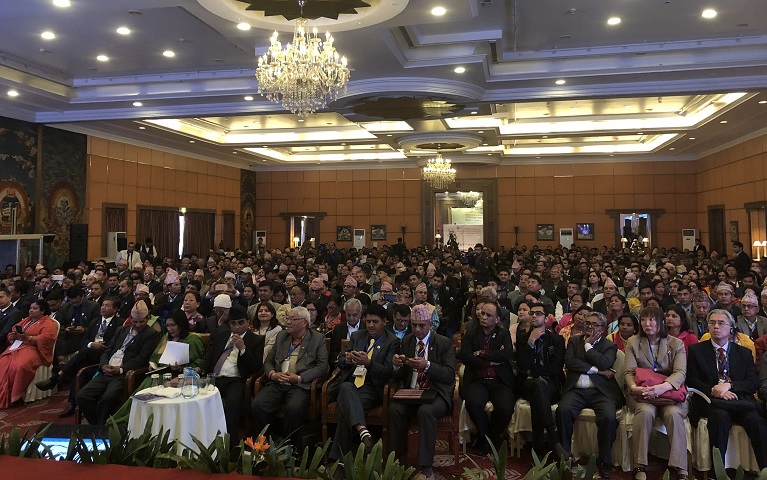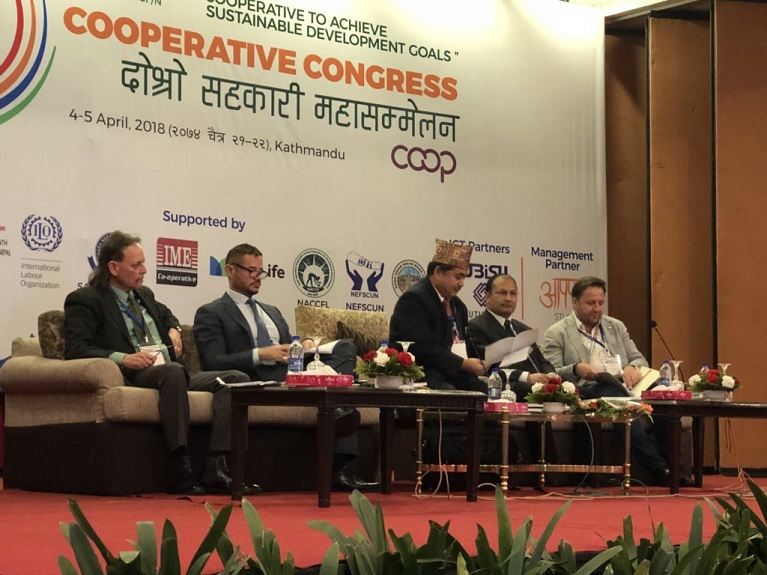ILO calls for decent job creation at 2nd Cooperative Congress in Nepal
Nepal hosted a jamboree of cooperative leaders in Kathmandu from 4-5 April 2018, underlying the role of cooperatives to achieve UN Sustainable Development Goals (SDGs).

This view was shared with the 1,000 delegates from 22 countries at the 2nd Cooperative Congress organized in Kathmandu. The Ministry of Agriculture, Land Management and Cooperatives and the National Cooperative Federation of Nepal (NCF) jointly organized the event with financial support from International Labour Organization (ILO) . NCF is one of the 29 implementing partners of the UNNATI-Inclusive Growth Programme in Nepal, funded by the Danish Government and implemented by ILO Kathmandu with a focus on creating an enabling environment for dairy cooperatives by undertaking advocacy initiatives, awareness raising and networking of farmers and cooperative members about their rights, occupational safety and health practices and appropriate policy facilitation.
In his inaugural speech Prime Minister KP Sharma Oli said the public, private and cooperative sectors are the three pillars of the national economy through which Nepal’s economy could get a boost in the new economic framework of federalism. He also urged cooperatives to maintain trust and improve capital formation that leads to productive growth among the less privileged.
Finance Minister Yubaraj Khatiwada said the government is preparing to devise policies to give extra leverage for cooperatives to make investment in areas of infrastructure, food security, good governance, hydropower and renewable energy. “It is not enough that we generate jobs in these sectors. Jobs must be decent to help workers live a dignified life,” he emphasized.


Similarly National Programme Coordinator of ILO/UNNATI Programme, Nabin Kumar Karna facilitated a panel discussion on Cooperative to Cooperative Business Model: Challenges and Potentials. “Cooperatives should be a powerhouse for productivity and capital formation, especially in rural areas for an alternative business model which responds to the needs of all stakeholders; employers, workers, suppliers, customers, and the local community, including environment and future generation, especially food product items based on cluster approach,” he said and underscored the need to identify businesses that are to Nepal’s competitive advantage.
There are over 34,512 primary cooperatives and 69 cooperative networks in Nepal. According to the Department of Cooperatives, cooperatives enjoy over 302 billion rupees in deposit and contributes a good deal to the gross domestic product (GDP). The government introduced a revised Cooperative Act in 2017 to give cooperatives a larger playing field for investment and business opportunities. The conference also mulled the enabling environment for cooperatives via endorsing necessary legal frameworks.